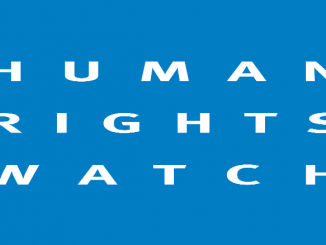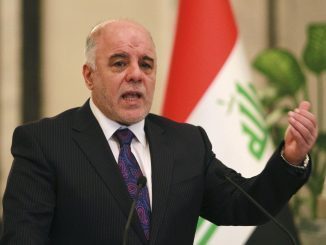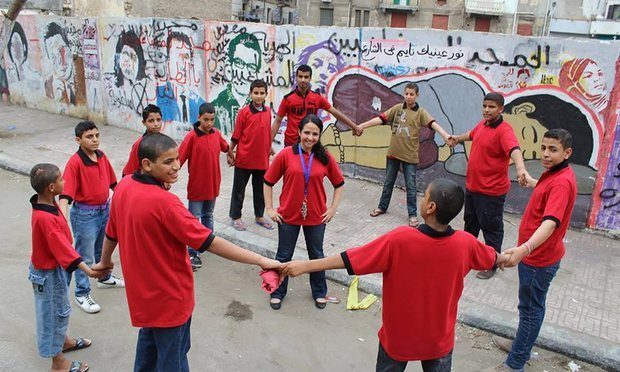
President Mohamed Morsi -the first democratically elected president of Egypt- is the only political prisoner who has been barred from the basic prisoners’ rights during his detention.
Ahmed Morsi -the son of Egypt’s President Mohamed Morsi, who was deposed by a military coup by Abdel-Fattah Al-Sisi, Egypt’s Defence Minister at the time- said that the authorities continue to deprive his father of the basic rights of a political prisoner, as his family has not been able to check on him for a long time, adding that no politician has ever been treated in that way throughout the modern history.
He wrote on his Facebook account, “Throughout the three past years, we have been barred from visiting my father and checking on him and this still continues.” He added, “No politician has ever been prevented from contacting his family and lawyers in the modern history.”
This wasn’t the first time Morsi’s family express their dissent from the Egyptian regime’s denial of their right to visit Morsi throughout three years of his detention.
Since President Morsi -the first democratically elected civilian president- was overthrown by a military coup in 2013, he was banned from visitation rights.
Morsi’s son Usama said that his family has been barred from visitation rights to President Morsi, who won the country’s first free election in 2012.
Usama wrote on his Facebook account last June that they were prohibited from visiting his father for four Ramadans (month of fasting for Muslims) respectively.
He said, “This is the fourth Ramadan that comes while President Mohamed Morsi is in prison since the military coup on July 4, 2013. It is necessary on the anniversary of the advent of Ramadan to make the public opinion aware of what is going on with the father and Mr. President detainee.”
His son Usama met him four times at the Police Academy headquarters (where he is tried) for a few minutes each, where the most recent one was in January 2015. The President’s wife and the rest of the family members have not been able to visit the President since November 2013. Usama stated that the President’s family does not know anything about his food, his place in prison, or his detention and health conditions. The family is not also allowed to send him clothes or any personal belongings.
Usama also said that dozens of official demands were raised to allow the President’s family to visit him, but there was no response from the coup regime. “Family visitations for prisoners are an inalienable right guaranteed by all constitutions, law and justice systems around the globe,” Usama added.
In the statement of President Morsi’s family which was addressed to the public opinion, the family called on “all human rights organizations and those interested in public affairs, as well as international organizations to intervene to stop this crime, which is committed to a political will from the coup authority and a direct complicity from the Egyptian judicial authorities.”
The statement also said the family will not stop “attempting to visit and communicate with President Mohamed Morsi until whatever God has ordained takes place”.
Morsi’s family confirmed that they still do not recognize Al-Sisi’s military coup, saying, “This does not change the position of the president or his family of the non-recognition of the military coup.”
Masrawy, an Egyptian news website has recently confirmed that the Mufti of Egypt Dr. Shawqi Allam approved the death sentence against President Mohamed Morsi, and the other defendants in the cases known as “espionage” and “Wadi Al-Natroun prison escape”.
According to the Egyptian law, all death sentences must be endorsed by government’s leading religious authority before they are implemented.
In this context, Amnesty International Organization for human rights has denounced Morsi’s death sentence as “a charade based on null and void procedures.”
President Morsi was overthrown by Abdel-Fattah Al-Sisi in a military coup on June 4, 2013. Since then, the military coup authorities have launched massive attacks against Morsi’s supporters, and the leaders and members of the Muslim Brotherhood, which is considered the major political opposition force against the military coup.
The Egyptian security forces have arrested thousands of Muslim Brotherhood leaders and members, including President Morsi, and sentenced them to life in prison or death in mass trials carried by the Egyptian judicial system -one of the military coup arms. Earlier this week, an Egyptian court sentenced 187 Morsi supporters to life in prison on various charges.
Here is the full text of the statement of President Morsi’s family which was published on the Facebook page of Usama Morsi, President Morsi’s son.
A Message from President Morsi’s Family to the Public Opinion last June read:
This is the fourth Ramadan that comes while President Mohamed Morsi is in prison since the military coup on July 4, 2013. It is necessary on the anniversary of the advent of Ramadan to make the public opinion aware of what is going on with the father and Mr. President detainee.
Mr. President Mohamed Morsi, as far as we know, is the only detainee in Egypt that his family has been altogether banned from visiting him in prison since the military coup on the third of July, 2013 up till now, except for once on the seventh of November, 2013. His son Osama met him four times at the Police Academy headquarters (where he is tried) for a few minutes each, where the most recent one was in January 2015. The President’s wife and the rest of the family members have not been able to visit the President since November 2013. The President’s family does not know anything about his food, his place in prison, or his detention and health conditions. It is not also allowed to send him clothes or any personal belongings. Dozens of official demands were raised to allow the President’s family to visit him, but there was no response. Allowing the President’s family to visit him in prison is his right that is guaranteed by all international constitutions and laws (including the Egyptian Constitution), not an honor.
Though the President’s family has never complained and is well aware of the size of the challenge that is facing the Egyptian revolution, however, it believes that this does not rob it (the family) of its rights.
While the President’s family is making this clear for everyone, it calls on all human rights organizations and those interested in public affairs, as well as international organizations to intervene to stop this crime, which is committed to a political will from the coup authority and a direct complicity from the Egyptian judicial authorities.
The President’s family will not stop attempting to visit and communicate with President Mohamed Morsi “until whatever God has ordained takes place”
This does not change the position of the president or his family of the non-recognition of the military coup.
The family of President Mohamed Morsi
June 5, 2016
Morsi Unfair Trials
In June 2016, Cairo Criminal Court sentenced President Mohamed Morsi to life in prison and an additional 15-year prison sentence in what is known as the Qatar espionage case. Life sentences in Egypt are 25 years behind bars according to Al-Ahram (a state-owned newspaper).
In addition, the Egyptian court confirmed the death sentence of six defendants two among them are journalists of Al-Jazeera for allegedly passing state secrets to Qatar. Amnesty International Organization condemned Morsi’s verdict and described his trial as a “fundamentally unfair” trial.
According to Morsi’s lawyer, “He was acquitted of supplying Qatar with classified documents but found guilty of leading an unlawful organization.” Moreover, Abdel Moneim Abdel Maksoud said the former President was also convicted of having “stolen secret documents concerning state security” and handed another 15-year jail term at the Cairo Criminal Court.
The final verdict on the case was issued by the Judges, but the advice of Egypt’s Grand Mufti must still be sought before they are confirmed according to the Egyptian law.
Al-Ahram reported that prosecutors originally claimed that Morsi and the head of his office, Ahmed Abdel-Ati, passed files to Secretary Amin El-Serafy, who then passed them to his daughter, Karima, who gave them to an agent. All were given life sentences of 25 years and additional 14-year terms.
The other defendants include journalists and activists, who were charged with scheming to pass documents to Al-Jazeera, which is based in Doha, and a Qatari spy.
Ibrahim Helal, the former director of news at Al Jazeera’s Arabic channel, was sentenced to death as well as the Alaa Sablan the former correspondent after being accused of leaking national security documents to Qatar.
The other defendant who received a death sentence is Asmaa Alkhatib,a journalist at Rassd News Network.The three journalists aren’t in Egypt and they were tried in absentia.
The other three men who were handed the death penalty are in Egyptian custody – Ahmed Afifi, Mohamed Kilani, and EgyptAir flight attendant and academic Ahmed Ismail.
Accordingly, International human rights organizations as Amnesty International, Human Rights Watch and Reprieve condemned the trials, while the Committee to Protect Journalists lists Egypt as one of the most dangerous places for reporters to work.
Amnesty International said in its annual report that criminal justice system was serving as “an instrument of state repression” and political persecution.
Regarding Morsi’s trials, Amnesty described them as being “fundamentally unfair” as they relied on evidence gathered while he was subject to enforced disappearance by the army during the months after being removed from power.
Morsi has been sentenced in four major trials. The former president was sentenced to death for alleged involvement in a mass prison break during the Arab Spring, 20 years imprisonment over the detention and torture of protesters and life over supposed collusion with foreign militant groups including Hamas and Hezbollah. All sentences are currently being appealed and he remains in custody.
Morsi Was Enclosed in List of Terrorists by the Military
In July 2016, Egypt’s court had ruled to include Mohamed Morsi to Egypt’s official list of “terrorists”.
The Cairo Criminal Court also ruled to include the Muslim Brotherhood group on the state’s list of “terrorist entities”.
It was also reported that 35 individuals, including Morsi, had been placed on the list for a period of three years.
A lawyer for a number of the individuals included on the list Ismail Abu Baraka said that all 35 had been convicted earlier of “collaborating” with Palestinian resistance movement Hamas, which is ideologically close to the Muslim Brotherhood.
However, he noted that an appeal against the convictions had since been lodged with Egypt’s Court of Cassation.
Moreover, Abu Baraka went said that the court ruling calling for Morsi’s inclusion on the “terrorist” list had originally been issued in April “but defense lawyers had not been informed and did not attend the court session”.
Morsi and his co-defendants, along with a number of independent observers, say the charges against him are politically motivated.
Since the military coup, the Egyptian has launched a massive crackdown on the Muslim Brotherhood, killing hundreds and throwing tens of thousands in prisons.



